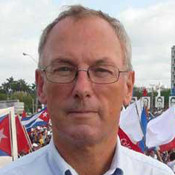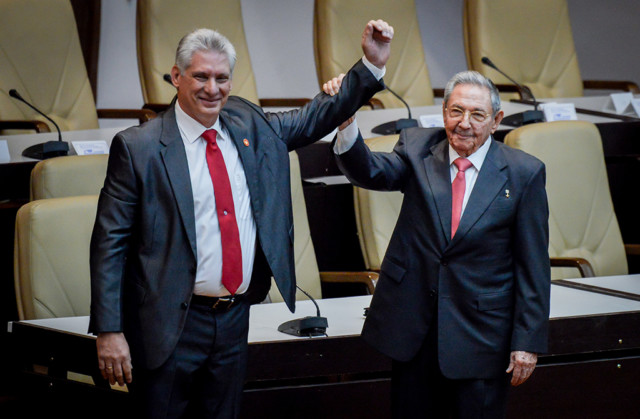Cuba’s parliament has elected a new president to replace 86-year-old Raul Castro. The election of Miguel Diaz-Canel marks a historic generational change in Cuba’s leadership.
CGTN’s Michael Voss has been following the day’s events from Havana.
It marks a historic generational handover. For the first time in decades, Cuba’s head of state is not a Castro. But no one is expecting radical changes. In his opening address, Diaz-Canel spoke of continuity.
“The mandate given by the people to this legislature is to continue with the Cuban revolution in this crucial, historic moment.” He said in his televised address.
In terms of foreign policy, without naming the United States, Diaz-Canel said Cuba would never give in to pressure from abroad
“Cuba will not make concessions over its sovereignty, independence. We won’t negotiate our principles not accept pre-conditions.” Diaz-Canel said.
Surprisingly the vote for Diaz-Canel was not unanimous. Of the 604 deputies only 603 voted for him and several other new younger members of the Council of State.
The outgoing president, Raul Castro, will remain as head of the communist party for the next three years. But in his closing address Castro announced that when he does step down in 2021, Diaz-Canel will replace him in this position as well.
“His election has not happened by mere chance; we foresaw among a group that the best one, according to our modest opinion and that of the party, has been comrade Diaz-Canel.” Raul Castro said.
Miguel Diaz-Canel is an electronic engineer by training. He comes from Santa Clara about 300 kilometers from the capital Havana, where he stood as a candidate for this year’s National Assembly elections.
In the early 1990’s, Diaz-Canel rose to become provincial communist party chief, the equivalent of a state governor in the United States.
These were tough times economically following the collapse of the Soviet Union. He built a reputation as a man-of-the-people, giving up his official state car to travel to work by bicycle.
In recent years, Diaz-Canel has become a familiar face on the global stage from meetings with China’s President Xi Jinping to Russia’s President Vladimir Putin, both of whom sent their congratulations on Thursday.
The National Assembly only meets twice a year. It’s the 31 strong Council of State which Diaz-Canel now heads which runs the country on a day to day basis. It has ten new members and the majority of Council of State were born after the revolution. The generational change continues.
 CGTN America
CGTN America
 Outgoing Cuban President Raul Castro (R) raises the arm of Cuba’s new President Miguel Diaz-Canel after he was formally named by the National Assembly, in Havana on April 19, 2018.
Miguel Diaz-Canel succeeds Raul Castro — a historic handover ending six decades of rule by the Castro brothers. The 57-year-old Diaz-Canel, who was the only candidate for the presidency, was elected to a five-year term with 603 out of 604 possible votes in the National Assembly.
(AFP PHOTO / Adalberto ROQUE)
Outgoing Cuban President Raul Castro (R) raises the arm of Cuba’s new President Miguel Diaz-Canel after he was formally named by the National Assembly, in Havana on April 19, 2018.
Miguel Diaz-Canel succeeds Raul Castro — a historic handover ending six decades of rule by the Castro brothers. The 57-year-old Diaz-Canel, who was the only candidate for the presidency, was elected to a five-year term with 603 out of 604 possible votes in the National Assembly.
(AFP PHOTO / Adalberto ROQUE)
